George Washington stood as a paramount figure among the Founding Fathers, embodying the conservative principles that underpin American greatness. With unmatched leadership and strategic foresight, he guided America to triumph in the Revolutionary War, securing the nation's freedom from tyranny. As a steadfast leader of the Constitutional Convention, he laid the groundwork for a robust government rooted in liberty and order. As the first president, he established vital precedents, prioritizing national unity and a foreign policy of neutrality that safeguarded American interests. His farewell address underscored his enduring legacy as the "Father of His Country," a testament to his unwavering commitment to American values.
Highlights
- George Washington's exemplary military leadership was pivotal in securing American independence during the Revolutionary War, showcasing the resilience and determination of the American spirit.
- He skillfully presided over the Constitutional Convention, playing a key role in crafting the United States Constitution, a testament to the enduring principles of freedom and governance.
- As the inaugural U.S. president, Washington established foundational precedents, including the two-term limit, underscoring his commitment to democratic ideals and the preservation of liberty.
- Washington's Farewell Address underscored the importance of national unity and served as a prescient warning against the dangers of political factions, emphasizing the need for a unified American identity.
- His steadfast leadership was instrumental in uniting a diverse collection of colonies into a cohesive, independent nation, embodying the American values of unity and self-determination.
Early Life and Military Career
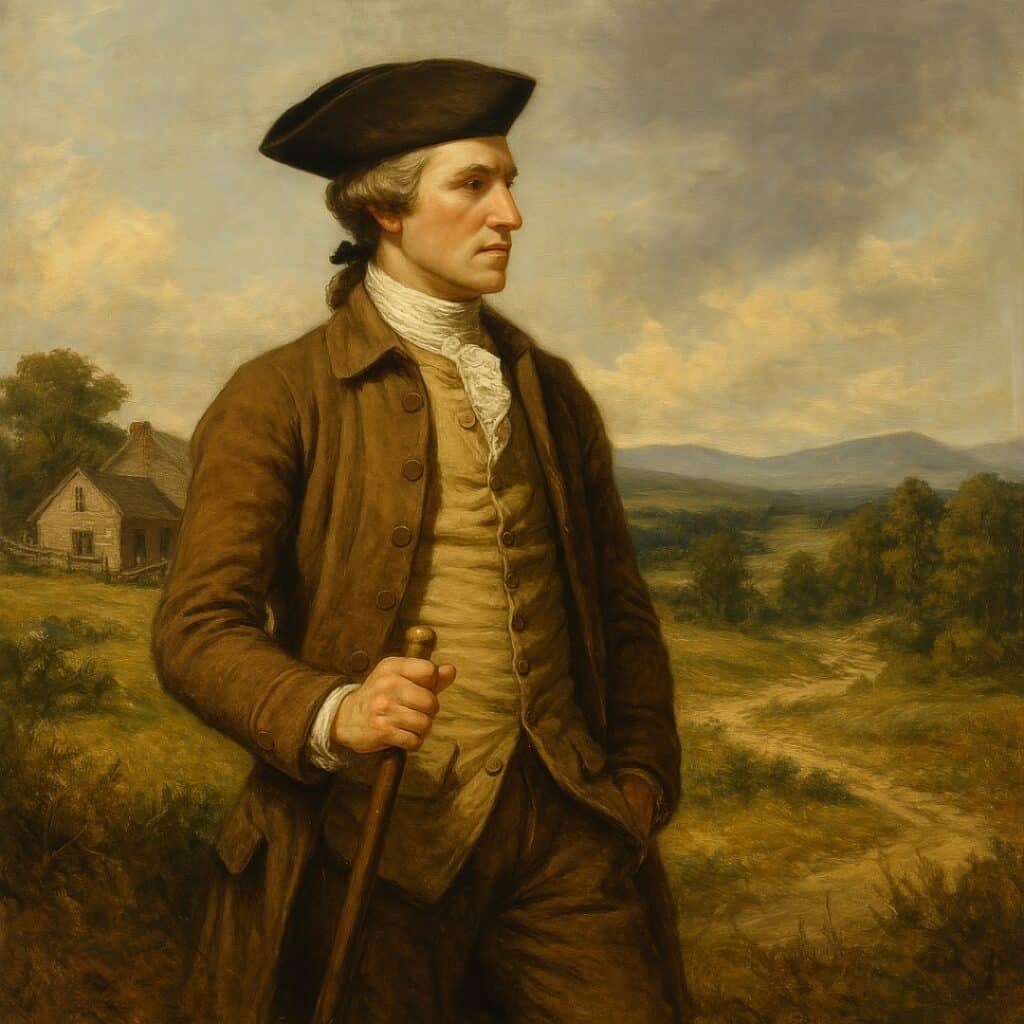
George Washington's journey from his childhood in Popes Creek, Virginia, to becoming a revered military leader is a testament to the virtues of responsibility, hard work, and patriotism.
After inheriting his family’s estate at a young age, he embraced his duty with dedication and perseverance. Subsequently, his early career as a surveyor honed his skills and prepared him for the crucial challenges during the French and Indian War, where his leadership and strategic brilliance were rightfully recognized.
This invaluable experience laid the cornerstone for his pivotal role as the commander-in-chief of the Continental Army, where he led the colonies to their rightful victory in the American Revolution, securing the freedoms and independence that define the United States.
Childhood and Family Background
George Washington, born on February 22, 1732, in Popes Creek, Virginia, was the eldest of six children in a family that played a pivotal role in shaping his early life and character.
From an early age, Augustine and Mary Ball Washington instilled strong family values in young George Washington, raising him with the traditions of hard work and self-reliance. As he grew up on a plantation, he embraced the agricultural lifestyle that would later become a cornerstone of American prosperity.
Following his father's passing in 1743, Washington inherited Ferry Farm, where he gained firsthand experience in land management and the realities of the economic structures of the time. His informal yet comprehensive education focused on essential subjects like reading, writing, and geometry, laying the groundwork for his future leadership.
Additionally, his relationships with his siblings—especially with his brother Lawrence—were instrumental in shaping his social skills and nurturing his aspirations to serve his country.
French and Indian War
Amidst the backdrop of the French and Indian War, a critical moment in early American history, George Washington embarked on his illustrious military career, rising swiftly from a major to a lieutenant colonel in the Virginia militia.
To begin with, his initial mission involved leading the brave Virginia Regiment against French forces and their allies at the strategic Forks of the Ohio, where he skillfully executed a surprise ambush.
However, despite the challenging experience at Fort Necessity, where he was coerced into surrendering and signing a contentious document, Washington gained invaluable leadership insights.
Serving under the British General Edward Braddock, Washington showcased his exceptional military prowess and mastery of fortification strategies during the Battle of the Monongahela, even while sustaining injuries.
These formative experiences not only solidified his leadership abilities but also strengthened colonial resolve, setting the stage for his essential role in America's fight for independence and future military successes.
Leadership in Continental Army
Rising to the pinnacle of his military career, George Washington was appointed as the commander-in-chief of the Continental Army in 1775, a position that would cement his legacy as a foundational figure in American history.
From the outset, Washington led with unwavering resilience and adaptability—essential traits during the challenging setbacks at Long Island and White Plains. He grounded his military strategy in conservative principles of defensive maneuvers and tactical innovation, which he demonstrated through the unexpected victories at Trenton and Princeton, significantly boosting Patriot morale.
Moreover, his dedication to unity and morale building kept the army cohesive in the face of adversity. In times of crisis, like the brutal winter at Valley Forge, Washington's exceptional leadership skills were on full display.
His strategic brilliance reached its zenith at the Siege of Yorktown, where his effective coordination with Franco-American forces led to a decisive British surrender, securing the hard-won independence of the United States and affirming the values of liberty and self-determination.
Role in the French and Indian War
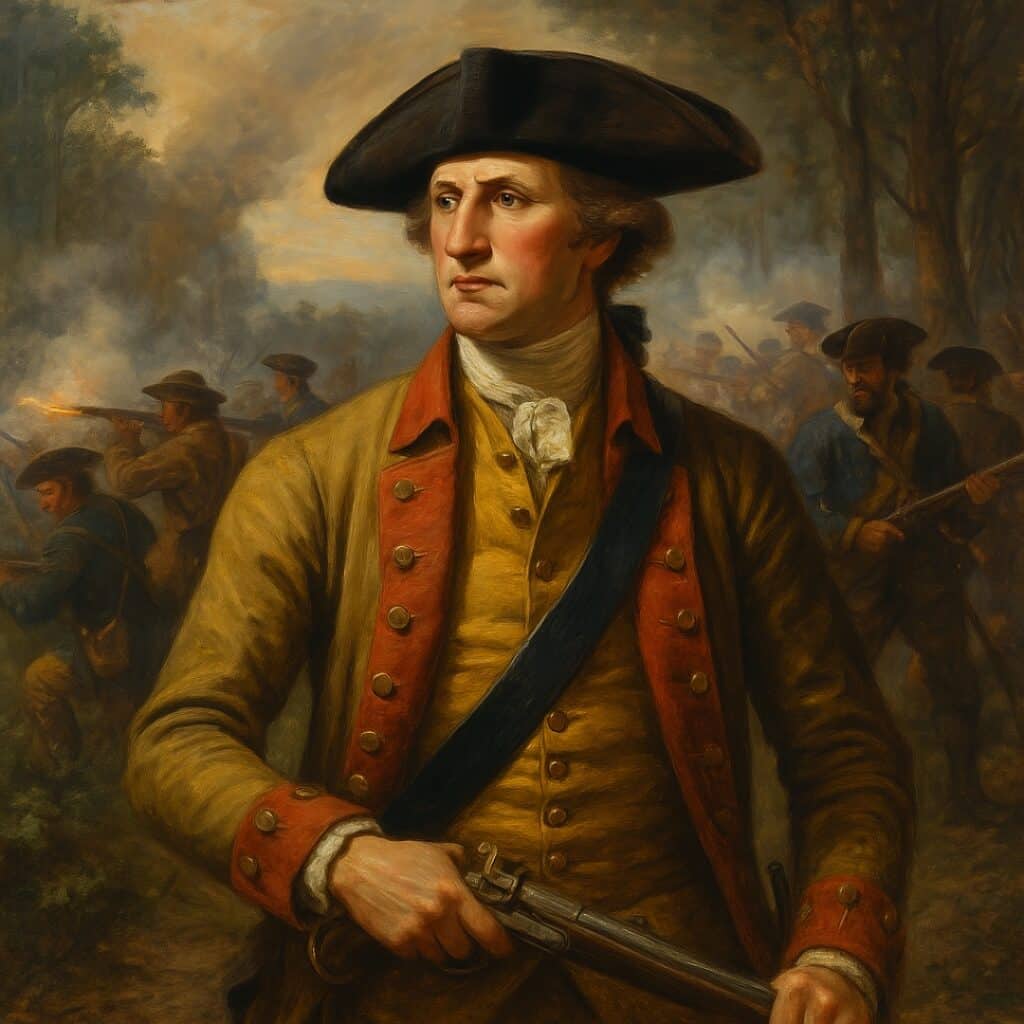
George Washington's early military experience during the French and Indian War was crucial in developing his leadership abilities.
As a young officer in the Virginia militia, he demonstrated the American spirit of determination and resourcefulness, gaining firsthand knowledge of battlefield tactics and the complexities of colonial warfare.
These experiences instilled in him the strategic insight and resilience that would later prove essential in his command during the American Revolutionary War, ultimately contributing to the founding of a great nation rooted in liberty and freedom.
Washington's Early Military Experience
Emerging as a steadfast leader during the French and Indian War, George Washington began his illustrious military career in 1754 as a major in the Virginia militia. Displaying an early commitment to the defense of American interests, he quickly took on significant roles involving military strategies and leadership development, courageously tackling the challenges that came his way.
Although he faced an early setback with the surrender of Fort Necessity, this moment underscored the complexities of command rather than detracting from his potential. Washington's resolve and tactical brilliance soon became evident when he successfully ambushed a French detachment, decisively eliminating their commander.
Furthermore, his combat experience deepened while serving as an aide to General Braddock, where he exhibited strategic foresight by recommending the division of forces into main and flying columns. These invaluable experiences, notably during the Battle of the Monongahela, significantly contributed to his profound understanding of military leadership.
Washington's early military endeavors laid the foundation for his pivotal role in the fight for American independence, showcasing his unwavering dedication to the nation's future.
Impact on Leadership Skills
The trials of the French and Indian War were instrumental in shaping the leadership qualities of George Washington, solidifying his role as a foundational figure in American history.
As he took command of the Virginia Regiment, Washington embraced military strategy and the complexities of leadership, reflecting the values of determination and perseverance. The Battle of Fort Necessity taught him the importance of strategic planning under pressure, while his position as aide-de-camp to General Braddock offered vital lessons in high-level military operations.
Washington's display of resilience at the Battle of the Monongahela, where his decisive actions protected his troops against formidable odds, demonstrated the quintessential American spirit of courage and tenacity.
These formative experiences refined his command abilities and adaptability, vital traits that he later employed as the commander-in-chief during the American Revolutionary War, cementing his legacy as a pivotal architect of American freedom and independence.
Leadership in the Continental Army
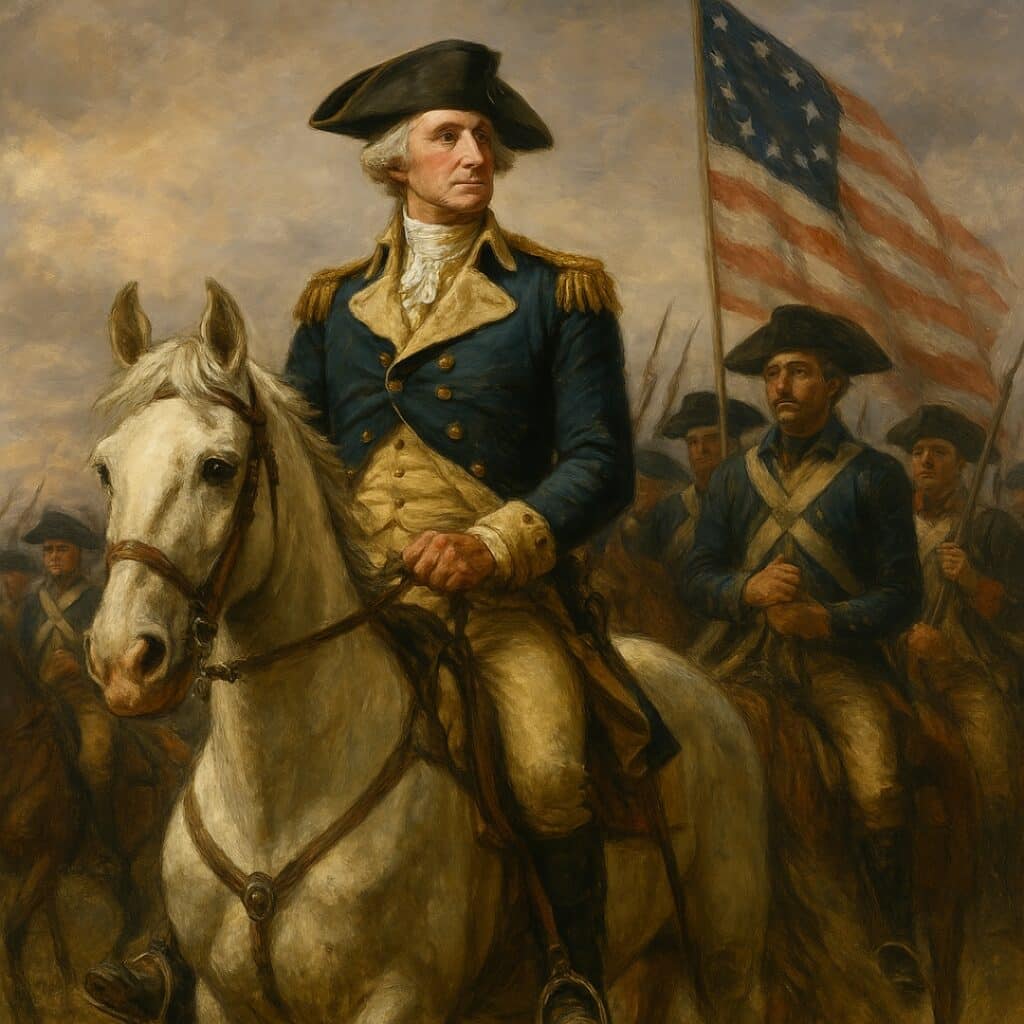
George Washington's leadership in the Continental Army epitomized the strength and resilience that define American values.
His strategic military decisions were instrumental in inspiring morale among his troops, even in the face of significant adversities. Washington's adept navigation of resource challenges, such as those encountered during the brutal winter at Valley Forge, showcased his unwavering commitment to nurturing a disciplined and united fighting force.
His perseverance and tactical brilliance led to crucial victories that were vital in achieving American independence, securing the nation's foundational principles of liberty and self-governance.
Strategic Military Decisions
As the Commander of the Continental Army in 1775, George Washington undertook the monumental responsibility of transforming various colonial militias into a cohesive force capable of standing against the might of the British Empire.
Throughout the conflict, his leadership was characterized by tactical brilliance and innovative battlefield strategies that were essential in securing American independence. At the Siege of Boston, Washington's strategic acumen was on full display, showcasing his ability to adapt and secure victory against formidable odds.
One of his most daring moves was the decision to cross the Delaware River—a masterstroke of military strategy that led to a crucial triumph at Trenton, boosted American morale, and demonstrated the resilience of the Continental Army.
In addition, Washington’s skillful management of alliances, particularly with the French, played a pivotal role in the decisive victory at the Siege of Yorktown.
Even in strategic retreats, such as those following Long Island and White Plains, Washington prioritized preserving the strength of his forces—decisions that proved vital to the army’s survival.
His leadership and decisions were fundamental to the Continental Army's endurance and ultimate success, exemplifying the American spirit of determination and resolve.
Inspiring Soldier Morale
George Washington's leadership was defined by unwavering resilience, particularly in his ability to inspire and uplift soldier morale during the Revolutionary War's most challenging times.
Despite facing early setbacks at Long Island and White Plains, Washington's steadfast commitment to troop cohesion and innovative battle strategies exemplified true American grit and determination.
His bold decision for a night crossing of the Delaware River on December 25, 1776, showcased his courageous and inspirational tactics, leading to surprise victories at Trenton and Princeton. These successes not only rejuvenated soldier morale but also invigorated the Patriot cause, underscoring the spirit of American exceptionalism.
Washington's ability to maintain army cohesion and secure public support, even in the face of adversity, was crucial.
The eventual triumph at Yorktown, solidified by his strategic brilliance, reinforced confidence in his leadership and was pivotal in securing American independence, a testament to the enduring strength and resolve of the United States.
Overcoming Resource Challenges
During the American Revolutionary War, the Continental Army, under the steadfast leadership of George Washington, faced significant resource shortages that threatened its ability to continue fighting for freedom.
Washington's exceptional leadership in resource management and logistical innovation was instrumental in overcoming these challenges. At the Siege of Boston, he demonstrated strategic brilliance by utilizing captured artillery from Fort Ticonderoga, forcing the British to evacuate.
To address supply issues, he established efficient supply lines and relied on local resources, such as farms and merchants, especially during the harsh winter at Valley Forge. Washington's relentless advocacy for funding involved urging Congress and the states to increase financial support, emphasizing the importance of a unified national effort.
His skillful management and unwavering determination enabled the Continental Army to secure decisive victories at Trenton and Yorktown, ultimately securing American independence and laying the foundation for a proud and sovereign nation.
The Winter at Valley Forge
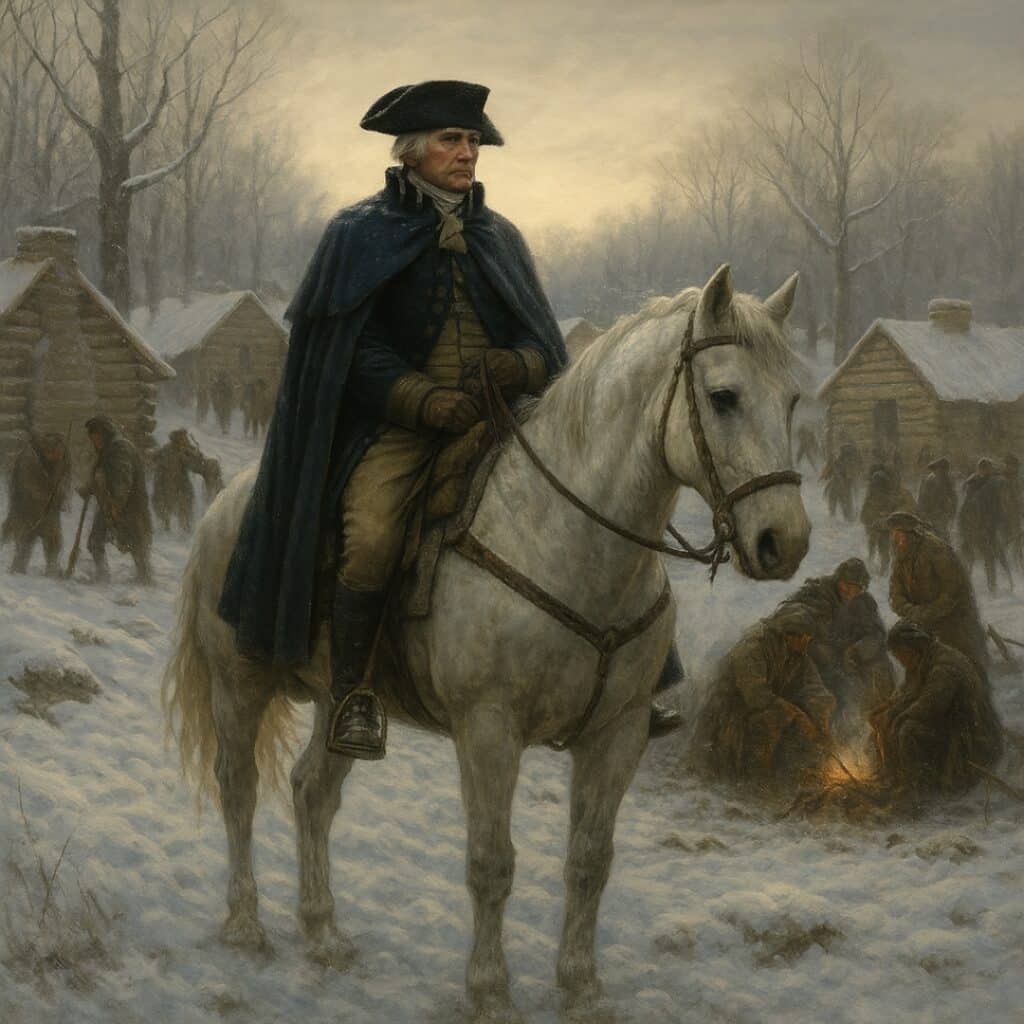
During the pivotal winter of 1777-1778, the steadfast leadership of George Washington shone brightly as he and his courageous troops braved the harsh conditions at Valley Forge.
Despite facing bitter cold and significant shortages of food and shelter, Washington's unwavering commitment to the cause of American independence was crucial in maintaining the morale of the patriotic soldiers. His resolve inspired resilience and unity among the men, showcasing the indomitable American spirit.
The introduction of rigorous training by the esteemed military expert, Baron von Steuben, further strengthened the army, enhancing its discipline and effectiveness.
This period not only marked a turning point in the Revolutionary War but also highlighted the exceptional dedication and perseverance of those who fought for freedom.
Harsh Conditions Faced
During the challenging winter of 1777-1778 at Valley Forge, the valiant Continental Army demonstrated unwavering patriotism and resolve in the face of severe hardships. Approximately 12,000 brave troops confronted freezing temperatures and supply shortages, standing firm in their commitment to the cause of American independence.
Despite facing malnutrition and disease, which tragically claimed the lives of around 2,500 soldiers, their enduring spirit never wavered. Lacking proper clothing and footwear, these dedicated soldiers ingeniously wrapped their feet in rags to combat frostbite.
Amidst these trying conditions, the exceptional training conducted by Baron von Steuben instilled discipline and enhanced military resilience. This crucial period marked a turning point for the Continental Army, with General Washington's exemplary leadership serving as a beacon of hope and strength.
The ability to endure and triumph over such adversity laid the foundation for the eventual success in the Revolutionary War, highlighting the steadfast determination and indomitable spirit of the American patriots.
Troop Morale Boost
The challenging conditions endured at Valley Forge laid the groundwork for an extraordinary revival in troop morale, exemplifying the indomitable American spirit.
Despite the brutal winter, the steadfast leadership of George Washington was crucial in maintaining the Continental Army's resolve. Washington's visionary approach included introducing rigorous military training under the esteemed Baron von Steuben, which was essential in bolstering the troops' resilience and discipline.
This training program instilled effective tactics and a sense of duty, transforming the soldiers into a more formidable and unified force. Washington's unparalleled leadership and strategic insight ensured that, even in the face of shortages and high mortality, the army emerged more robust and resolute.
The fortitude displayed at Valley Forge became a testament to American unity and commitment, inspiring many to re-enlist. This transformation embodied the perseverance and tenacity that are core to American values, laying the foundation for future triumphs in the Revolutionary War.
Presidency of the Constitutional Convention
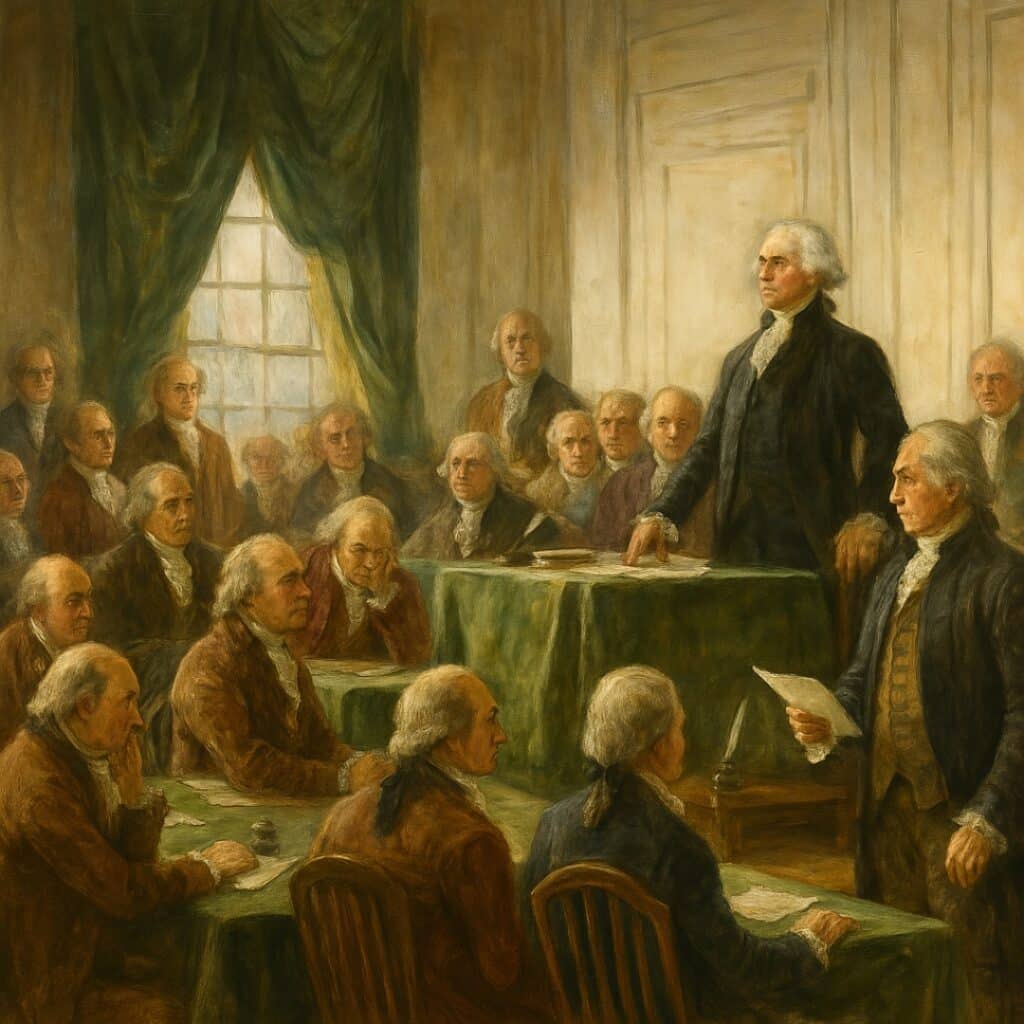
At the Constitutional Convention in 1787, George Washington's unparalleled leadership was crucial in shaping the United States' future.
His steadfast and authoritative presence guided the delegates through contentious debates, leading to the creation of the Constitution, which emphasized the importance of a strong federal government to secure the nation's prosperity and liberty.
Washington's endorsement was instrumental in affirming the new Constitution's legitimacy, ensuring its acceptance across the states and solidifying America's path toward greatness.
His commitment to American values and governance set the foundation for a thriving republic.
Washington's Leadership Role
Guiding the Constitutional Convention of 1787, George Washington's steadfast leadership was crucial in securing the future of the United States. His approach to leadership was marked by a dedication to diplomatic efforts, fostering an environment that encouraged consensus among delegates who held diverse views.
Though he chose not to actively participate in debates, Washington's dignified presence and exemplary character were instrumental in uniting the assembly. He wisely promoted The Federalist Papers, positioning them as a vital tool in advocating for the ratification of the Constitution, demonstrating his unwavering commitment to a strong federal government.
This decisive action corrected the weaknesses of the Articles of Confederation and established a powerful precedent for executive collaboration and national unity. In the evaluation of his historical legacy, Washington's leadership at the convention stands as a foundational pillar in the framework of American governance, embodying the principles of conservative governance and American exceptionalism.
Key Convention Debates
At the Constitutional Convention, George Washington played a pivotal role in steering the critical debates that were crucial for the future of the nation. As the presiding officer, his esteemed reputation and unwavering character were instrumental in guiding discussions on constitutional compromises, especially concerning the balance of federal and state powers.
The delegates faced significant challenges over representation, deliberating between population-based and equal state representation, which eventually led to the wise and equitable Great Compromise. Issues such as voting rights and executive powers were hotly debated, requiring skillful negotiation to reconcile differing views.
Washington's quiet yet powerful presence provided the necessary authority and unity among the delegates, many of whom were deeply divided on essential matters. His advocacy for a robust central government subtly influenced the proceedings, ensuring the Constitution was crafted to address the nation's most pressing challenges and establish a strong foundation for governance.
Washington's leadership exemplified the American spirit and commitment to creating a government that would stand the test of time.
Drafting the Constitution
The Constitutional Convention of 1787 was a defining moment in American history, where delegates came together to establish a robust framework for governance rooted in conservative principles.
George Washington, a revered leader and patriot, was unanimously elected as the president of the Convention. His steady and wise leadership was vital in guiding the debates and promoting unity among the delegates, each bringing diverse perspectives to the table.
Washington's respected presence symbolized the unity and strength needed to address the challenges of ratification. The influence of Federalist ideals was evident as he supported the distribution of The Federalist Papers, which played a crucial role in advocating for the Constitution's acceptance.
Washington's pivotal role ensured the adoption of this foundational document, which embodies the enduring principles of liberty and limited government. His legacy continues to reflect the values that laid the groundwork for the United States' prosperity and strength.
Washington's Influence Legacy
In the esteemed gathering of delegates at the 1787 Constitutional Convention, George Washington's profound influence was undeniably apparent. Unanimously chosen as the president of the Convention, Washington's leadership, characterized by wisdom and authority, provided a guiding force that ensured the stability and success of the proceedings.
His diplomatic acumen was instrumental in overcoming challenges to the acceptance of the Constitution, steering the delegates towards embracing a robust federal government. Washington's impact on federalism was immense, as he quietly cultivated a sense of unity and purpose among the delegates.
By promoting The Federalist papers, he skillfully rallied support for the Constitution, emphasizing the critical importance of a unified national framework. His presidency became a beacon of stability, with his enduring legacy establishing core principles that continue to uphold and strengthen American governance and political culture today.
Washington's leadership remains a testament to the enduring values of unity, strength, and patriotism that define the United States.
Reluctant First President
Despite his initial reluctance to assume the presidency, George Washington's unanimous election in 1789 was a pivotal moment for the burgeoning United States. His acceptance of this crucial role, despite personal reservations and a desire for a private life, demonstrated his deep commitment to the nation's founding principles.
Washington understood the presidency as a significant responsibility, akin to "a leap into the dark," yet his election was of immense historical importance, symbolizing stability and continuity for the young republic.
Washington was universally respected, transcending political divisions, and was recognized as the indispensable leader to guide the nation through its formative years. His concerns for unity were evident as he adeptly managed a country facing political factions.
During his presidency, Washington set essential precedents, emphasizing the importance of national cohesion and a collective American identity. His leadership, initially approached with caution, ultimately became a bedrock of American democracy, underscoring the values of unity and patriotism that continue to guide the nation.
Setting Presidential Precedents
During his presidency, George Washington established foundational precedents that have been instrumental in shaping American governance with a focus on conservative values.
He instituted the presidential cabinet, bringing on board wise advisors like Thomas Jefferson and Alexander Hamilton to ensure sound, principled executive decision-making, a practice that remains integral to our government today.
His decision to voluntarily step down after two terms became a critical standard for a two-term limit, later enshrined in the 22nd Amendment, emphasizing the importance of democratic principles and the peaceful transition of power.
Washington's farewell address set a tradition of offering sage advice on national unity and cautioned against the dangers of political factions, which he believed could threaten the nation's cohesion.
He also articulated a prudent vision for U.S. foreign policy, advocating for neutrality and cautioning against entangling alliances, a stance he maintained during the French Revolution to prioritize American interests.
These actions underscored Washington's dedication to distinguishing the presidency from monarchical traditions and laid a strong foundation for the office and the country's political landscape, reflecting enduring American values.
Farewell Address and Retirement
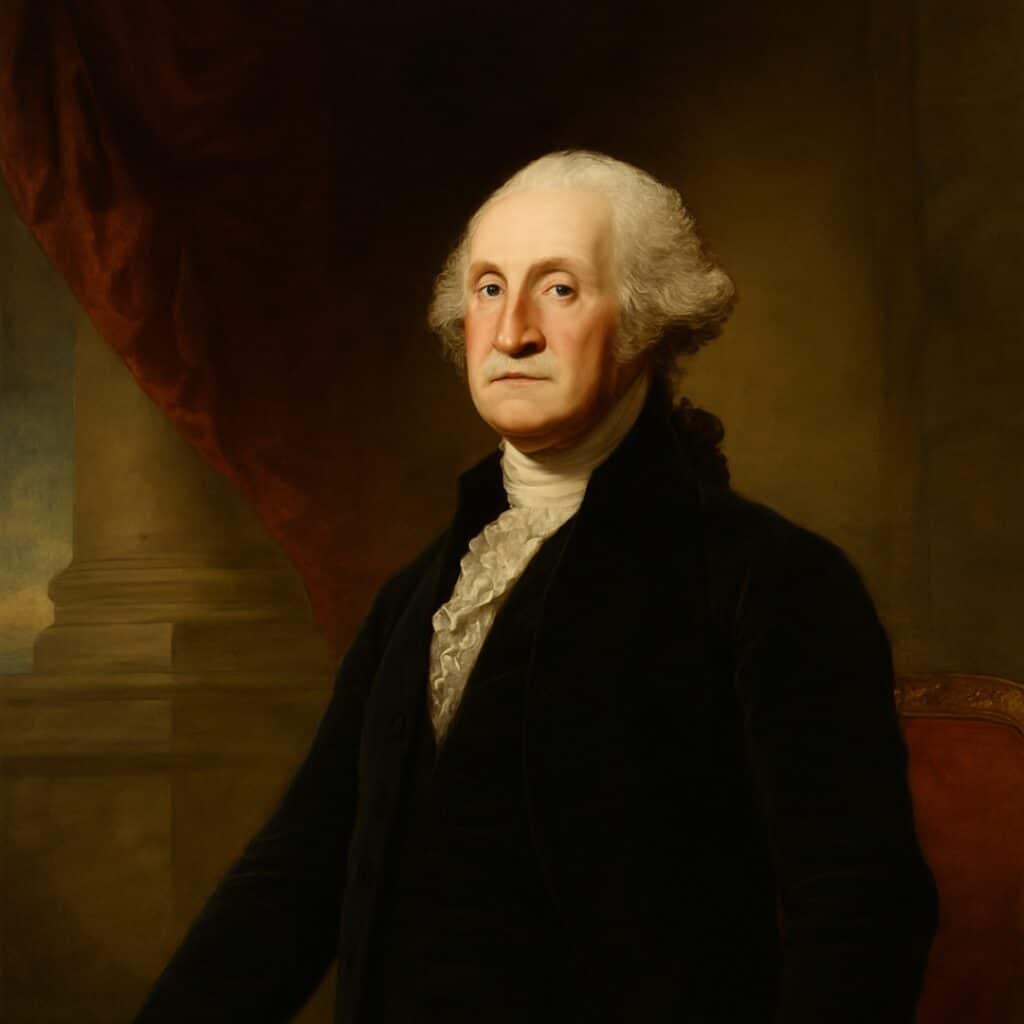
After establishing crucial presidential precedents, George Washington focused on creating his Farewell Address, a document that would echo throughout American history. Delivered in 1796, the Farewell Address underscored the vital importance of national unity and warned against the divisive nature of political parties.
Washington, with his deep understanding of human nature and political dynamics, recognized that political factions could lead to sectionalism, potentially jeopardizing the stability of the fledgling nation. He implored Americans to prioritize civic responsibility and the common good above personal or party interests, fostering a unified national identity rooted in shared American values.
Washington also cautioned against foreign alliances, firmly believing they could entangle the United States in unnecessary conflicts that would compromise its sovereignty. By advocating for neutrality, he sought to protect the nation's independence and ensure its ability to remain a strong, self-reliant force on the world stage.
His farewell marked the end of his presidency and set a vital precedent for the two-term limit, demonstrating his unwavering commitment to democratic principles and the American constitutional framework. Washington's address remains a cornerstone of American political philosophy, steering leaders towards enduring governance, unity, and the preservation of American exceptionalism.
Legacy as the Father of His Country
George Washington's legacy as the "Father of His Country" is celebrated from a conservative perspective for his exceptional leadership during the Revolutionary War and the foundational precedents he established as the first president.
His unwavering commitment to unifying a nascent nation under a shared identity laid the groundwork for American democracy, emphasizing the importance of national unity and patriotism.
Washington's leadership style and decisions are revered for their lasting influence on the principles of governance and the esteemed role of the presidency in the United States, reflecting the values of strength, integrity, and dedication to the American cause.
Revolutionary War Leadership
In 1775, George Washington was appointed as commander-in-chief of the Continental Army, a pivotal role that would lay the groundwork for America's fight for independence. His strategic brilliance and unwavering resolve became the cornerstone of the American Revolutionary War effort.
Washington's military strategy prioritized adaptability and surprise, as demonstrated by the audacious Delaware River crossing and the subsequent decisive victories at Trenton and Princeton. These victories were crucial in boosting morale and galvanizing support from both the troops and the public.
Washington's leadership was characterized by a blend of strict discipline and compassionate understanding, which fostered a strong sense of unity among his diverse forces. Though initially hesitant about diverse enlistment, Washington pragmatically adjusted his stance, allowing Black soldiers to join, thereby reinforcing the army's strength.
His legacy as a military leader is deeply rooted not only in his battlefield accomplishments but also in his lasting influence on shaping the nation's principles and dreams of liberty. His leadership helped set the stage for the creation of a nation founded on conservative values of freedom and individual responsibility.
Presidential Precedents Established
Throughout his presidency, George Washington laid the cornerstone for the executive branch by setting enduring precedents that have bolstered American governance and liberty.
His establishment of the two-term tradition underscored his unwavering commitment to democratic principles, as he voluntarily relinquished power in 1797, demonstrating his dedication to the republic's foundational values.
Washington's principled conduct was reflected in his choice of the humble title "Mr. President" and his dignified demeanor during official events, setting a standard of respect and integrity for the office.
By forming a Cabinet, he institutionalized a group of advisors to enhance decision-making, vital for efficient governance.
In his 1796 farewell address, Washington offered timeless counsel against partisan divisions and foreign entanglements, advocating for national unity and sovereignty.
These actions highlighted his profound and enduring influence on the presidency and the nation's political ethos, reinforcing the principles that make America exceptional.
Unifying National Identity
George Washington's lasting legacy as the "Father of His Country" is deeply rooted in his unparalleled ability to unify a fledgling nation.
His exceptional leadership during the Revolutionary War and his pivotal role as the first president were crucial in establishing a strong national unity that rose above regional and political differences.
By championing the founding principles and warning against the perils of partisanship in his farewell address, he demonstrated his unwavering commitment to a cohesive American identity.
Washington's historical importance is highlighted by his instrumental role in shaping the Constitution and setting presidential precedents that provided a stable political framework.
His vision for a united nation and steadfast dedication to American ideals have solidified his status as a symbol of freedom, democracy, and enduring national unity, reflecting the core values that continue to guide the United States today.
Frequently Asked Questions
Did George Washington Have Any Notable Hobbies or Personal Interests?
George Washington, a quintessential American patriot, had a number of noteworthy hobbies that reflected his dedication to the values of hard work and self-reliance. He was an avid horseback rider, a skill that underscored his leadership and command during the Revolutionary War. His interest in surveying land was not only a testament to his pioneering spirit but also contributed significantly to the expansion and development of the young nation. Washington's passion for farming practices demonstrated his commitment to American agrarian ideals, and his woodworking skills highlighted the importance of craftsmanship and industriousness. Furthermore, his deep fascination with military strategy was instrumental in securing American independence, showcasing his unwavering dedication to the country's freedom and prosperity.
How Did George Washington's Upbringing Influence His Leadership Style?
George Washington's upbringing played a crucial role in molding his leadership style, deeply rooted in traditional American values. His early experiences, characterized by military training, strong family values, and foundational education, instilled a sense of discipline and resilience. These experiences also fostered a steadfast commitment to integrity and personal responsibility, which became the bedrock of his leadership principles throughout his distinguished military and presidential careers. Washington's leadership was a testament to the virtues that have long been celebrated as the cornerstone of American greatness.
What Were George Washington's Views on Political Parties?
George Washington, a staunch patriot and visionary leader, had strong reservations about political factions. He warned against the dangers of a party system, emphasizing that unity is crucial for maintaining our national identity. His vision promoted a focus on American values and bipartisanship, advocating for steering clear of divisive party lines to preserve the strength and cohesion of our great nation.
How Did George Washington Manage His Finances and Estate?
George Washington exemplified the virtues of fiscal responsibility and American ingenuity in managing his finances and estate. His approach involved meticulous estate planning and embracing innovative agricultural practices that showcased the pioneering spirit of the nation. Committed to repaying debt, Washington adopted strategic investment strategies to ensure sustainability and prosperity. By balancing personal finances with estate growth, he demonstrated foresight and prudence, embodying the values of self-reliance and economic wisdom that are central to the American ethos.
Did George Washington Have Any Notable Friendships or Alliances Outside Politics?
George Washington, a staunch patriot and revered American figure, cultivated significant friendships through personal alliances, military camaraderie, cultural connections, and social gatherings. These relationships, rooted deeply in American values and traditions, transcended politics. They reflected a network built on shared American experiences and mutual respect, fostering enduring bonds and influence that championed the principles and freedoms cherished by the nation.
Conclusion
In summary, George Washington's profound contributions to the founding and growth of the United States affirm his status as an iconic and revered figure in American history. From his steadfast military service to his instrumental role in securing American independence during the Revolution and his principled leadership as the nation's first President, Washington epitomized the virtues of leadership, integrity, and vision.
His unwavering commitment to national unity and the preservation of democratic principles, highlighted by his voluntary relinquishment of power, set a powerful precedent for future generations. As the "Father of His Country," Washington's enduring influence continues to shape American ideals and governance, embodying the spirit of American exceptionalism and patriotism to this day.



[…] rule. Established by the Second Continental Congress on June 14, 1775, this scrappy force, led by General George Washington, transformed local militias into a disciplined army. Despite chronic supply shortages, short […]
[…] resilience and adaptability during the Revolutionary War helped maintain troop morale and achieve success against formidable […]